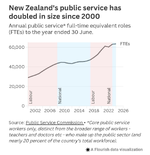The issue is there is a major profit incentive for the generator-retailers in NZ to maintain limited capacity. Our State Owned Enterprise (SOE) legislation appears to be really poor and prioritises profit generation over almost any public good.Think of it like the milkman. When everyone on the street buys milk, its profitable for the milkman, because he has to make the drive regardless. Now if only half they street buys milk, his revenue is halved but fixed operating costs remain the same. (the same drive). Now imagine that half that doesnt buy, they all have a cow, because a cow makes milk for free. If you need lots of milk 24/7 then 1 cow isnt very efficient. So you start calling on the milkman on-demand. The issue here is the milkman never knows how much milk to take on his run,. too much and it spoils, not enough and people run out.
Now imagine politicians advocating for more milking herds and for everyone to have a cow too. Problem is milk goes off so now govt has to buy everyone a fridge (analogy is a shit fight but stay with it).
Also evidence of the four major Gentailers using borrowing and non-cash accounting adjustments to overpay dividends.
In 2014 - 2021 the four main Gentailers (Genesis, Meridian, Mercury and Contact Energy) paid out 3.7 billion MORE in dividends than they generated in profits.
In 2023 the same companies distributed $1.1 Billion in dividends, yet only earned $521 million in net profit.
The under investment in renewable generation has resulted in constrained supply, which drives up electricity prices and benefits shareholders at the expense of consumers. Despite 80-90% of our electricity being generated cheaply from legacy renewables like hydro, fossil fuel generation during peak load sets the market price, inflating costs across the board and further boosting gentailer profits.
Last edited:

